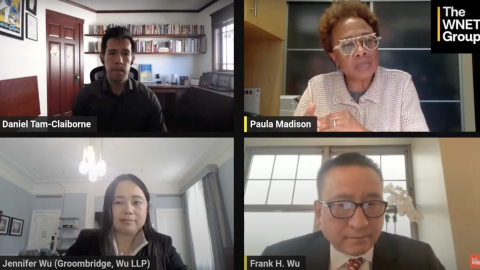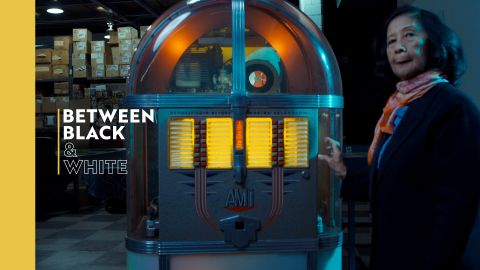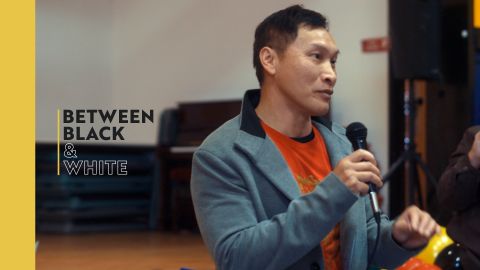Jenni Rudolph: I grew up in Orange County, California, and I am Cantonese and Ashkenazi Jewish. I definitely felt like I didn’t really fit in with other Asian-American. Simultaneously, I wanted to feel more Jewish. But Jews in Orange County, we had to be kind of quiet about it.
Jenni Rudolph: I haven’t seen the Haggadah yet, like printed. It looks amazing and it’s so us, like colorful and vibrant and useful.
Jenni Rudolph: We came up with the idea for Lunar in 2020, so it was already this time of increasing hate crimes both against Jews and against Asian-Americans. And so we would check the news and it’s like, Oh, which of my people was hate crimed today? Okay, Antisemitic hate crime. Lovely. Anti-Asian hate crime. Amazing. It was just this this back and forth, this wave. And I think a lot of us had suppressed our feelings around it. You kind of had to.
Jenni Rudolph: The Lunar Collective was founded as a film series. We really felt that we needed a community with which to make ourselves visible.
Sound up film: I am a Korean-American Jew.
Sound up film: Half South African Indian and half Ashkenazi Jewish.
Sound up film: I’m adopted from Vietnam. Both my parents are Ashkenazi Jews.
Sound up film: I identify as being both Taiwanese and Ashkenazi Jewish.
Jenni Rudolph: So first it was just that shock that, okay, there are so many of us. Wow. All of us thought we were the only Asian Jew, Chinese and Jewish. So I’m Chewish. Like, why did it take us this long to find each other?
Sound up film: I thought everyone had Chinese grandparents. I thought everyone did Shabbat every Friday.
Sound up film: What do the Asians think about this? I’m like, Well, I don’t know. There are more than a billion Asian people.
Sound up: I would see myself as not Asian, but also not white.
Sound up film: Very complicated stuff, very emotionally gunky concepts of not enough.
Jenni Rudolph: Nothing is ever black and white when it comes to Asian-American Jewish identity.
Singing: Oh. I was just a child.
Jenni Rudolph: So my song, Water and Oil, I was like, I don’t fit in. And it was a kind of like earlier stage, like angsty feelings around mixed identity. Over time, the songs started to evolve to then kind of bringing in like microaggressions I experienced and realizing like, this is the landscape I live in and kind of unearthing some of the frustration and resentment that I felt underneath the surface.
Jenni Rudolph: I think when people think about commonalities between the Jewish community and the Asian-American community, they often lean on model minority tropes like, oh, they’re both really into education and like all these other things that are sometimes true and sometimes very much not.
Vincent Pan, Co-Executive Director, Asians for Affirmative Action:This really flattens both communities and the reality within the Asian-American community. There’s a tremendous diversity.
Rabbi Jacqueline Mates-Muchin: I think calling Jews or Asian-Americans the model minority sets us apart from other minorities in kind of a teacher’s pet sort of away.
Jon Osaki, Filmmaker: It’s not a good thing. It’s really part of a political strategy to divide communities, to say, you know, if you are quiet and don’t speak out, that’s that’s what a good minority does. And when you do speak out, when you are vocal, that’s being a bad minority.
Jenni Rudolph: When I think about the cyclical nature of antisemitism and anti-Asian racism, I think the simple answer is just that in both cases we are an easy scapegoat.
Rabbi Jacqueline Mates-Muchin: I think we’re living in a time that’s really polarized. I think we’re living in a time where things are harder and less predictable. And I think in those moments that people look for folks to blame.
Tyler Gregory Executive Director Jewish Community Resource Council, San Francisco: Because we’re perceived to be successful or hard working. These anti-Semitic tropes of control or conspiracy theories manifest. And I see the same thing happening with Asian-American communities, especially as the rivalry between the U.S. and China heats up. This sort of xenophobic tradition that our that our country has had for over 200 years. We see that really bubbling to the surface against both the Asian and Jewish communities right now.
Jon Osaki, Filmmaker: I think both communities are always going to be one national emergency away from being the target of hate in this country. And when I say that, I’m talking about things that happen on the geopolitical level in Asia, things that happen in Israel.
Vincent Pan, Co-Executive Director, Asians for Affirmative Action: If we want fairness and dignity and respect for one community, we have to fight for fairness, dignity and respect for all communities.
Rabbi Jacqueline Mates-Muchin: The fact that the conversation around race is usually black and white, I think means that people are disregarded, that if they don’t fit into one camp or the other, that basically their experiences are considered secondary.
Vincent Pan, Co-Executive Director, Chinese for Affirmative Action: In order to achieve the promise of true equality and true equity, we do need different groups to work together in ways that are transformative, that allow us to actually understand our both different and common experiences, to share power and to ultimately work towards common goals.
Rabbi Jacqueline Mates-Muchin: So growing up biracial, there’s huge potential there for those of us who understand completely what it means to be a part of multiple traditions to see how well things can come together and see how well things can harmonize.
Seder: How is this night different from all other nights?
Jenni Rudolph: I definitely think Lunar is in a unique position to act as a bridge between the Jewish community and the Asian-American community. And then from there, I think it’s all about deepening our relationships with our broader communities and being able to stand together collectively against hate. If we can craft a more inclusive landscape now then future, generations of Asian Jews won’t automatically have that imposter syndrome that struggle to fit in or to claim their identity or to really connect. They’ll think of the joy of finally having this community, this home, and being able to engage in it, indulge in it, celebrate our identities, feel really proud.
Seder: Chag Sameach! (Happy Holiday)



